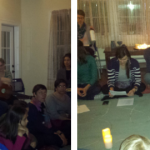DEFUSING HATRED AND ANIMOSITY
Harboring rancor and animosity means looking for re- venge and retribution. The heart of one who is envious or rapacious has been darkened and their mental facilities are taken over by vengeance. This feeling of vengeance grows until it pushes out all the love and faith in a person, and they be- gin to put revenge before everything, even obedience to God.
By contrast, freeing the heart of rancor and enmity quickly brings a psychological balance and harmony between the heart and mind, the physical and the spiritual. A person who can keep their temper under control will be of greater benefit to society and able to cultivate their higher emotions to their full potential.
In the Qur’an God tells us that the rancor and enmity harbored by people have a dangerous potential to trigger injustice:
O you who believe! Be upholders and standard-bearers of right for God’s sake, being witnesses for (the establishment of) abso- lute justice. And by no means let your detestation for a people (or their detestation for you) move you to (commit the sin of) deviating from justice. Be just: this is nearer and more suited to righteousness and piety. Seek righteousness and piety and always act in reverence for God. Surely God is fully aware of all that you do. (Maeda 5:8)
Every type of anger and vexation gives rise to mental problems and physical illnesses. Without sincere forgiveness, without “letting go,” total recovery is impossible. Hatred, animosity, rage, wanting to “get even” or see others punished, even criticism and reproach, all pollute the mind, weaken the soul, and eventually ruin a per- son’s health. It could be said that overcoming anger can be achieved if one nurtures a desire to help others and trains one’s thoughts along these lines, as well as trying to seek to live a life that is more “behind the scenes” rather than striving to be the center of atten- tion. In the Qur’an God says,
They spend (out of what God has provided for them,) both in ease and hardship, ever-restraining their rage (even when pro- voked and able to retaliate), and pardoning people (their offenses). God loves (such) people who are devoted to doing good, aware that God is seeing them. (Al Imran 3:134)
Human nature is created in such a way that a person can fluc- tuate between good and bad. Knowing this, it is necessary to know how to deal with one’s own ego, keeping in mind that good comes from God while evil comes from the ego and leads to ulti- mate destruction. A person who knows that they are prone to vac- illating between good and bad actions must expend extra energy to ensure that they refrain from major sins and to avoid situations that could lead to doing wrong: “Those who avoid the major sins and indecent, shameful deeds (which are indeed to be counted among major sins), and when they become angry, even then they forgive (rather than retaliate in kind)” (Shura 42:37).
Furthermore, in order to avoid anger or antipathy, we have been given several strong mainstays, such as praying for one’s own forgiveness, the forgiveness of our brothers and sisters in religion, and that of our spiritual ancestors, asking God not to allow seeds of bitterness and anger against believing people grow in our hearts, and expecting these prayers to be accepted; these are all stated in the following Qur’anic verse:
And all those who come after them (and follow in their foot- steps) pray, “O our Lord! Forgive us and our brothers (and sisters) in Religion who have preceded us in faith, and let not our hearts entertain any ill-feeling against any of the believers. O our Lord! You are All-Forgiving, All-Compassionate (espe- cially toward Your believing servants). (Hashr 59:10)
There are also some useful indications in the life and practice of Prophet Muhammad, peace and blessings be upon him, regarding the control of anger and animosity. Some of these enlighten- ing hadith are as follows.
The Prophet warned Anas ibn Malik while the latter was still a child, telling Anas that he should forgive those who had done him wrong, and thus avoid having his spirit sullied with enmity or lin- gering resentment. Anas ibn Malik related the following narration from the Messenger of God: “My child! Every morning and every evening, make sure you hold no grudge or enmity against anyone. Do this, if you can, my child! This is my example. Whoever fol- lows my example truly loves me. And whoever loves me will be with me in Paradise.”16 As we can see, those who can purify their hearts of jealousy, anger, and animosity will be together with the Prophet and reach Heaven.
Anger that burns the soul brings a feeling of vengefulness to the heart and can feed vengeful actions. Some people easily lose their temper. They are merciless, severe, and cruel. Some people, though they have quick tempers, are also quick to recover from anger.
In this regard the Prophet divided people into three basic groups, according to how quickly they anger and how quickly their anger departs. He also explained which one of these groups is most virtuous. In addition, he gives an immediate practical so- lution for anger: taking ablutions to help the feeling subside.
Abu Said al-Khudri narrated, “God’s Messenger said, ‘Be aware that there are people who are slow to anger and quick to repent of their anger; there are also people who are quick to an- ger and quick to get over it. There is also a third group of people, who anger quickly and are slow to let their anger go. The best of these are those who are slow to anger and quick to turn from an- ger. The worst are those who are quick to anger and are slow to let their anger go. Beware! Anger is like a burning ember in the heart of man. Do you not see the eyes that glow and the cheeks that puff out? Whoever feels himself beginning to get angry, he should touch the ground….”17
Accordingly, taking ablutions or bathing as well as touching the ground or walking on the soil barefoot are some practical ways of dispelling anger. But there is another dimension as well: one who feels overwhelmed by anger should seek refuge in God.
Muadh ibn Jabal relates, “Two people cursed each other in the presence of the Messenger. The face of one of them showed anger at the other. God’s Messenger said, ‘I know a word that you can say to ward off the anger that I see in your face. That is a‘udhu
billahi min ash-shaytan ar-rajim (I seek refuge in God from Satan,
who is eternally rejected from God’s Mercy).’”18
Abu Hurayra provided the following hadith: “A man asked the Prophet, ‘O Messenger of God! Give me a short, easy piece of advice, that I won’t forget it.’ He repeated his request several times, and the Prophet answered with, ‘Don’t get angry!’”19
A person with a quick temper should be careful not to miss good advice or exhortation by becoming upset at being urged to that which is good or commendable (and therefore not listening to the other person). Ibn Abbas narrates that when Uyayna ibn Hisn came to Medina, he stayed with his nephew Hurr ibn Qays, who was a person whom Umar used to keep near him as one of the learned men who knew the Qur’an by heart (qurra) and who by virtue of their knowledge can give legal opinion or judgment (fuqaha). Uyayna said to his nephew, “O nephew! You are close to this ruler, so ask him for an audience for me!” So the nephew asked Caliph Umar for this. But when Ibn Hisn came into Umar’s presence, he said, “Beware! O the son of Khattab! By God, you neither give us enough provision nor judge among us with jus- tice!” Umar was extremely upset. He was almost ready to hit Uyayna when Hurr jumped up and said,
“O Ruler of the Believers, God said to His Messenger, ‘Adopt the way of forbearance and tolerance, and enjoin what is good and right, and withdraw from the ignorant ones (do not care what they say and do)’ (A’raf 7:199). This man is ignorant.” When Hurr recited this verse Umar instantly froze in his tracks; he could not ignore the Qur’an, so he did nothing to the insolent man.20
A person who is overwhelmed by anger will have trouble making sound decisions. There is a direct prohibition regarding situations like this. Abu Bakr told his son ‘Abdullah, who was serving as a judge, “When you are angry, do not judge between two people. For the Messenger said, ‘No one should judge be- tween others when he is angry.’”21
Concerning the verse, “Goodness and evil can never be equal.
Repel evil with what is better (or best). Then see: the one between whom and you there was enmity has become a bosom friend. And none are ev- er enabled to attain it (such great virtue) save those who are patient (in adversities and against the temptations of their souls and Satan), and none are ever enabled to attain it save those who have a great part in human perfections and virtues” (Fussilat 41:34–35), Ibn Abbas said, “‘what is better (or best)’ in this verse means ‘patience at the mo-
ment of anger, and forgiveness at the moment we are wronged.’ If people do these things, God will protect them from their enemies; He will cause their enemies to become friends for them.”22
Gulcu, Dr. Musa Kazim. “Good Character” Tughra Books Press. February 2009.
Related Posts
- November 13, 2013
- 0 Comment









